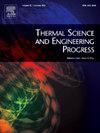先进地热驱动三重冷却系统的固有安全设计:4E和基于安全的优化框架
IF 5.4
3区 工程技术
Q2 ENERGY & FUELS
引用次数: 0
摘要
向使用可再生能源的能源系统供应燃料是可持续发展和最佳利用能源的一项基本战略。本研究提出了一种创新的三级制冷系统,利用地热能满足中小型工业应用中的冷冻、冷却和空调需求。提出的三蒸发器冷却系统(TECS)采用三蒸发器/单喷射器配置,以改进传统的喷射器制冷。TECS在包括食品加工、制药和酒店在内的多温度冷链行业中具有强大的适用性。系统优化采用多目标遗传算法,结合4E(能源、能源、经济和环境)评价和固有安全性分析。选择异丁烷作为工作流体是因为它具有优异的热力学性能和最小的环境影响。其中,空调负荷为44.07 kW,制冷负荷为25.23 kW,冷冻负荷为35.5 kW。性能系数、火用效率系数、单位成本产品比系数(UCPR)、单位环境产品比系数(UEPR)和总风险系数分别为0.502(无因次)、16.81%、66.44美元/GJ、10.42亿点/吉焦耳和1088美元/年。综合的多目标优化在所有指标上产生了显著的改进。此外,参数化研究表明了影响参数对系统性能指标的影响。结果表明:随着地热流体进入发电机组温度的升高,系统的性能系数保持不变,但总循环火用效率降低,系统的产品成本增加,产品的环境成本降低。本文章由计算机程序翻译,如有差异,请以英文原文为准。
Inherently safety design of an advanced geothermal-driven triple cooling system: 4E and safety-based optimization framework
Supplying fuel to energy systems using renewable sources is a fundamental strategy for sustainable development and optimal utilization of energy resources. This study presents an innovative three-level cooling system meeting the freezing, cooling, and air conditioning demands in small-to-medium industrial applications using geothermal energy. The proposed Triple Evaporator Cooling System (TECS) employs a three-evaporator/single-ejector configuration to improve conventional ejector refrigeration. TECS demonstrates robust applicability in multi-temperature cold chain industries including food processing, pharmaceuticals, and hospitality. System optimization utilizes a multi-objective genetic algorithm with integrated 4E (energy, exergy, economic, and environmental) evaluation and inherent safety analysis. Isobutane is selected as the working fluid for its superior thermodynamic performance and minimal environmental impact. Base case results show that the air conditioning, cooling, and freezing loads are reported as 44.07 kW, 25.23 kW and 35.5 kW, respectively. Furthermore, the coefficient of performance, exergy efficiency, unit cost product ratio (UCPR), unit environmental product ratio (UEPR), and total risk are 0.502 (dimensionless), 16.81 %, 66.44 $/GJ, 1042 million points per gigajoule, and 1088 $/year, respectively. The comprehensive multi-objective optimization yields significant improvements in all metrics. Furthermore, a parametric study demonstrates the impact of influential parameters on the system’s performance indicators. The results indicate that with increasing temperature of the geothermal fluid entering the generator, the system’s coefficient of performance remains constant, while the total cycle exergy efficiency decreases, the system’s product cost increases, and the environmental cost of the product decrease.
求助全文
通过发布文献求助,成功后即可免费获取论文全文。
去求助
来源期刊

Thermal Science and Engineering Progress
Chemical Engineering-Fluid Flow and Transfer Processes
CiteScore
7.20
自引率
10.40%
发文量
327
审稿时长
41 days
期刊介绍:
Thermal Science and Engineering Progress (TSEP) publishes original, high-quality research articles that span activities ranging from fundamental scientific research and discussion of the more controversial thermodynamic theories, to developments in thermal engineering that are in many instances examples of the way scientists and engineers are addressing the challenges facing a growing population – smart cities and global warming – maximising thermodynamic efficiencies and minimising all heat losses. It is intended that these will be of current relevance and interest to industry, academia and other practitioners. It is evident that many specialised journals in thermal and, to some extent, in fluid disciplines tend to focus on topics that can be classified as fundamental in nature, or are ‘applied’ and near-market. Thermal Science and Engineering Progress will bridge the gap between these two areas, allowing authors to make an easy choice, should they or a journal editor feel that their papers are ‘out of scope’ when considering other journals. The range of topics covered by Thermal Science and Engineering Progress addresses the rapid rate of development being made in thermal transfer processes as they affect traditional fields, and important growth in the topical research areas of aerospace, thermal biological and medical systems, electronics and nano-technologies, renewable energy systems, food production (including agriculture), and the need to minimise man-made thermal impacts on climate change. Review articles on appropriate topics for TSEP are encouraged, although until TSEP is fully established, these will be limited in number. Before submitting such articles, please contact one of the Editors, or a member of the Editorial Advisory Board with an outline of your proposal and your expertise in the area of your review.
 求助内容:
求助内容: 应助结果提醒方式:
应助结果提醒方式:


